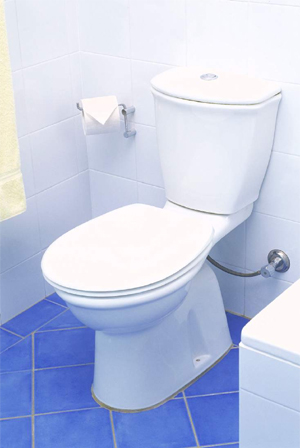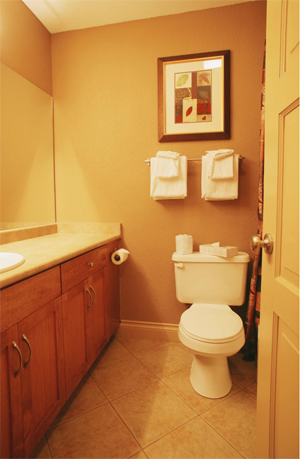Atlanta, GA
404-872-0024
404-872-0024
Alpharetta, GA
770-475-4496
770-475-4496
Charlotte / Raleigh, NC
980-819-5515
980-819-5515
Nashville, TN
615-771-7477
615-771-7477
Charleston, SC
843-856-8255
843-856-8255
Plumbing - Toilets
Toilets, formerly called water closets doesn’t always get the attention they deserve. There are variations that now allow for more comfort, higher quality and more powerful flush designs.
Considerations:

- Things to look for
- Toilets with a deep, rich glaze insure an even, easy to clean surface.
- The internal trap should be glazed providing a smooth surface for easier flow of waste and to prevent clogging.
Options:
- Size
- Toilets come in different sizes so before buying, check your available width, height and depth.
- Most toilets are bolted about 12” from the wall, some manufacturers make toilets that are 10” and 14” from the wall.
- As a general rule, you should maintain 16” of space from the centerline of the toilet to a leteral obstruction at least 48” L and 48” W of an open space in front of the toilet.
- Height
- There is no set standard height for toilets, but most usually range from about 14.5” to 17”. The 17” height versions are made for ADA compliance.
- Lined tanks
- Reduce the condensation produced by the temperature difference between the inside and the outside of the tank.
- Water Conservation
- Dual flush models conserve water by having a separate flush for liquid waste and another for solid waste. The flush selector is located on the side of the tank.
- Flush Types
- Flush types are more important than ever because of the law restricting toilets to a flush rate of 1.6 gallons rather than the former luxury of 3 ½ to 7 gallons per flush.
- Gravity fed flush toilets use the force of gravity and a siphon pull through action to offer high performance and quiet waste disposal. These are the most common type, but they are no longer the most effective option due to the limitations on water usage.
- Siphon Jet toilets are similar to gravity fed toilets, except that there is an additional opening in the trap that shoots out a jet of water to help dispose of the waste. This is done to improve the performance.
- Pressure assisted toilets are powered by compressed air entrapped into a special pressure tank to create a powerful push through flush. Waste is removed in about 4 seconds. These toilets are a little louder than gravity fed toilets, but are becoming more and more popular.
- One company offers a series of pressure assisted toilets that run on battery power so it does not require an additional electrical socket. They are designed to flush only when the user closes the lid eliminating the problem in every co-ed household of leaving the toilet seat up.
Design Options:
- Type – both one and two piece toilets conserve water by using 1.6 gallons of water per flush.
- One Piece toilets are actually six to ten separate individual pieces that are sculpted into a seamless, space saving unit. The benefit is that there are no crevices between the tanks and bowl to collect dirt and odors. One piece toilets are more contemporary than two piece toilets.

- Two Piece toilets have a traditional separate tank and bowl which are bolted together at the time of installation. Most of these toilets are not sold with the seat. Be sure to check at the time of purchase to see what is included with your toilet. With the purchase of a two piece toilet, consider buying an optional insulated tank. These are built with a rubber coating inside that will better prevent sweating from condensation.
- Urinals are gaining popularity in residential applications because of the space they save. Since wall mounted toilets are mounted from the wall, all of the pipe connections are concealed. This also reduces the noise that is usually transferred through the floor when the toilet flushes. When installing, be sure to decide whether you want a concealed tank or an exposed tank. A concealed tank is a tank that is hidden in the wall and a flush activator is used to flush the toilet. The exposed tank is visible, similar to the tank on a regular toilet.
- One Piece toilets are actually six to ten separate individual pieces that are sculpted into a seamless, space saving unit. The benefit is that there are no crevices between the tanks and bowl to collect dirt and odors. One piece toilets are more contemporary than two piece toilets.
- Seat
- Round front toilets fit better in small, tight spaces and are typically less expensive than elongated bowls. They stretch 16 ½” from the front of the bowl to the bolt holes in the back of the seat. These are found in secondary bathrooms more often and are better for potty training girls.
- Elongated front toilets have an extended rim length and are more comfortable for adult use. This toilet is better for baths with high traffic. Some parents prefer to use elongated seats when potty training boys.
- One company offers a compact elongated bowl style. This toilet type maintains the overall length size of a round front bowl, but has an elongated shape.
- For those that can’t remember to put the toilet seat down, there are now toilet seats that take care of that for you.
- Flushing lever location
- Most toilet handles are located on the side, but some models have a pull up knob that is on the center of the back of the tank lid. Another option is a side mounted electronic switch to flush.
- Accessories
- Toilets come with handles in various colors, but these can be changed to compliment or match other finishes in the bathroom like hardware and faucets.
- Heated toilet seats are available to make the toilet experience as comfortable as possible!
- Colors
- Toilets come in a variety of colors to compliment other colors in the bathroom. Common colors are: white, black, beige and other neutrals, gray, red, blue and even green!
Maintenance:
- Pressure assisted toilets very rarely clog and clean themselves well.
- Gravity flush toilets are clog more and not clean the rims of the bowls as well as they used to.
- Wall mounted toilets are the easiest to clean because they eliminate having to clean a toilet base!

